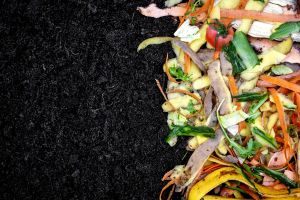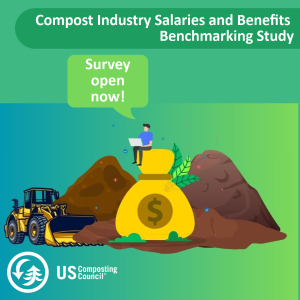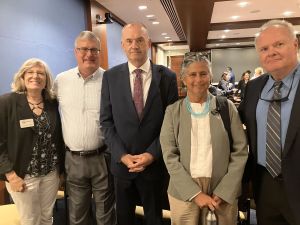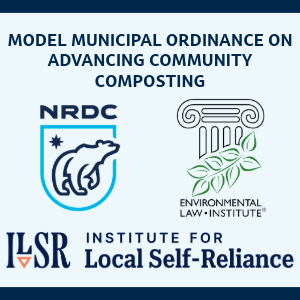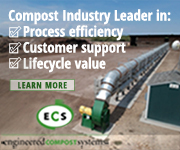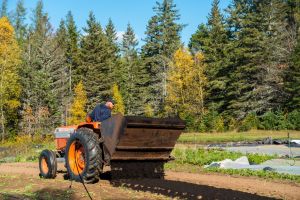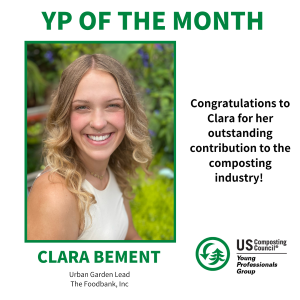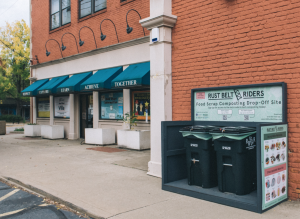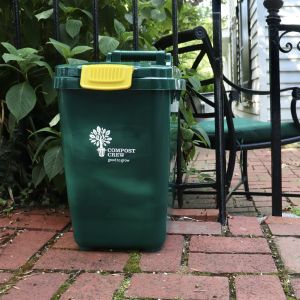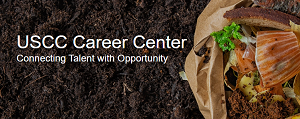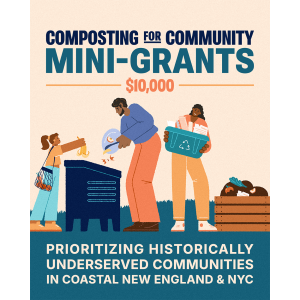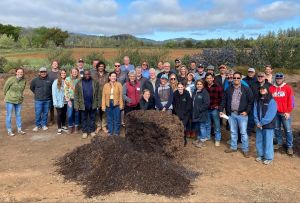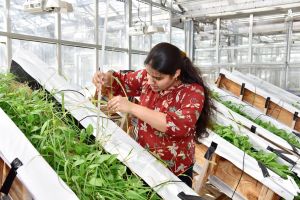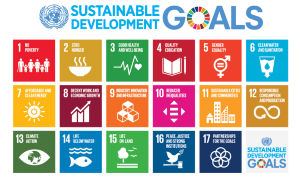 |
|||||||||||||||||||||||||||||||||||||||||||||||||||||||||||||||||||||||||||||||||||||||||
| Past Issues | Subscribe | Send to a Friend | compostingcouncil.org | |||||||||||||||||||||||||||||||||||||||||||||||||||||||||||||||||||||||||||||||||||||||||
Linda Norris-Waldt
Executive Director
One of the reasons USCC exists is to fight for high-quality compost and compost producers—and to equip our advocates and communities to do so as well.
It’s time to ring the bell again!
The need to re-educate policy makers on the need to source separate organics seems to have come up in cycles throughout USCC’s history – and this time it’s happening at one of the longest-running, most educated markets for compost and composting: Seattle and Washington State.
As we move further into the digital age, the USCC has embarked on a process of cleaning, securing, and modernizing our databases. Data Manager Eric Ohman is tirelessly leading this project, having begun implementation of the long-term Master Data Plan by laying the foundation for scalable, quality data operations. Early benchmarks in the implementation of this plan have been: reducing hundreds of duplicate member records, establishing processes to manage erroneous data across our systems, and launching the USCC STA program via the Gateway.
This summer, USCC hired a Data Management Intern, Sydney Seiter, to help with the next steps in the implementation of the Master Plan. As the data team’s work continues, their goals include fostering a staff culture that feels empowered by data to make smarter decisions and strengthen our advocacy abilities; leveraging data to promote the composting industry’s impact and visibility; and exploring and implementing AI automation tools to streamline operations.
On July 14th, the US Composting Council launched the Compost Industry Salary and Benefits Benchmarking Study, the first of its kind for our industry.
Already, the many companies, nonprofits, and municipalities in the composting industry who provided us with a point of contact for the study have received instructions for participation and have begun filling out the survey. We want to encourage all of our members to join them in helping us create a robust data set for this study.
We are gathering critical data on compensation and benefits to help our members make better-informed hiring decisions. If you and your team would like to help in this landmark study, you can sign up today!
Sponsorships are now open for COMPOST2026—your chance to elevate your brand at the nation’s premier composting and organics recycling conference! Join hundreds of industry leaders and innovators in Sacramento as we spotlight the businesses driving sustainability, regenerative practices, and climate solutions. With dynamic sponsorship packages at every level, you’ll gain valuable exposure through booth space, signage, digital ads, social media promotion, branded materials, and more. Whether you're looking to make industry connections or showcase your commitment to the future of composting, this is the event to be seen at. Visit www.compostconference.com to explore the options and secure your sponsorship today!
The US Composting Council (USCC) announced today that Ryan Cerrato is filling a compost producer seat on the USCC Board of Directors. The seat was vacated by Michael Martinez, who became an affiliate member when he shifted from his role at compost producer LA Compost to a position at the 11th Hour Project.
Martinez moved over to occupy the affiliate seat of Meredith Danberg-Ficarelli of WA+TS, who has served on the USCC Board since she was first elected in 2021 and recently resigned to focus on her startup business. As a result of the vacated compost manufacturer seat, the Board of Directors has appointed Ryan Cerrato, of Denali, to serve out the remaining term.
On Wednesday, June 18th, more than 50 House and Senate Staff attended a hearing on the dangers of treating compost manufacturers and other "passive receivers" as polluters for the unintended entry of minute levels of PFAS in our operations.
Due to concerns about plant and animal uptake of PFAS, attention surrounding PFAS has been––unfairly––directed toward composters and other passive receiver industries, including wastewater treatment, drinking water, and solid waste. These essential public service industries do not generate PFAS but rather receive them in the media that they manage to protect human health and the environment.
The Congressional Briefing, led by a multi-industry group called the Passive Receivers Coalition and attended by USCC’s Executive Director Linda Norris-Waldt and Director of Public Policy Chris Snow, detailed the dangers of targeting passive receivers in PFAS legislation. In addition to passive receiver industry members, perspectives were heard from researchers, local governments, and public works departments.
The Institute for Local Self Reliance (ILSR), the National Resource Defense Council (NRDC), and the Environmental Law Institute (ELI) have collaborated to release the Model Municipal Ordinance on Advancing Community Composting. This new tool can help legislators and municipalities craft regulations that bolster the growth and operations of community composters. By supporting community composters with strong legislations, local governments can work toward a community-based, circular economy where community waste turns into community resource.
The USCC and Zero Foodprint are collaborating to provide growers with financial support to use compost in their operations. This project is supported and funded by the U.S. Department of Agriculture through a Natural Resources Conservation Service (NRCS) Conservation Innovation Grant (CIG). The research project, titled Comparative and Ongoing Compost Application Trials to Guide and Incentivize Best Use Amid New Compost Production Laws, includes $4.4 million distributed over 5 years. The USCC and grant partners will be able to provide up to $10,500 in assistance to growers looking to apply compost to their orchard, cropland, or rangeland. Funding can be used to help growers cover the cost of compost purchase, delivery, application, and technical assistance.
The Iowa Waste Reduction Center will be traveling throughout the Upper Midwest to provide on-site training and technical assistance in seven rural communities to teach attendees:
- How to compost food waste including best management practices, and
- How to use the finished product, compost, to protect water sources including rivers, lakes, and groundwater from pollutants and contaminants. Trainings are happening in Iowa, Minnesota, and Illinois through the month of August. Use the link below to find a training near you!
The 2025-2026 Young Professionals Scholarship Program application period is now open and accepting applications until July 31st.
This year we are offering Individual SoilBuilder Memberships to fifteen Young Professionals in return for volunteer service hours supporting the YP group's initiatives and events.
Those who apply and receive a membership estimated at $185 will have access to USCC member benefits such as free webinars and access to USCC's membership directory.
We are thrilled to highlight Lauren Click as July’s YP of the Month! Lauren is the Founder and Executive Director of Let’s Go Compost.
Lauren’s work currently supports 123 public schools in 10 states, soon expanding to 200 across 15 states, with free composting education and small-scale programs designed to build long-term infrastructure and workforce readiness. These schools, many of which are Title I, are among the largest publicly funded facilities in the country and typically lack access (whether physically or economically) to food waste diversion programs. In helping them launch and maintain composting systems, Lauren and Let’s Go Compost is working to create bottom-up demand for scalable, off site composting infrastructure.
Are you a passionate young professional looking to connect with like-minded individuals in the composting industry? Look no further! We invite you to join our vibrant and engaging Slack community.
By joining our Slack, you'll have the opportunity to:
It's easy to get started! Simply click the button below to join our Slack community and start connecting with fellow Young Professionals today.
Many composting programs across the country operate on an opt-in, subscription-based model. This means that, for individuals and households that can’t afford an additional monthly subscription, sending food waste to landfills is not an active choice but a forced behavior due to an issue of access. In an effort to close the composting access gap, USCC Member Rust Belt Riders is launching a new program in partnership with the City of Cleveland to offer 250 free compost drop-off subscriptions to eligible Cleveland residents. Using USDA grant funding through the Composting and Food Waste Reduction (CFWR) Cooperative Agreements program, Rust Belt Riders will expand their existing food scrap Drop-Off program to underserved neighborhoods in Cleveland and provide finished compost back to community food-growing projects.
The Shakopee Mdewakanton Sioux Community (SMSC) celebrated the grand opening of its new organics recycling facility, Dakota Prairie Composting, in Louisville Township on June 24th. The former site of the SMSC’s composting operation opened in 2011, and the process of acquiring and opening the new site has been unfolding for the last few years. Dakota Prairie Composting will process more than double the amount of the SMSC’s former organics recycling facility, recycling 155,500 tons of wood and yard waste and diverting an additional 25,000 tons of food scraps per year from local landfills—a reduction of 21,000 metric tons of carbon per year. Dakota Prairie Composting is a USCC Seal of Testing Assurance (STA) Certified compost facility.
The City of Frederick, Maryland, is partnering with USCC Member Compost Crew to take its curbside compost program beyond the pilot stage. The city began its pilot program using federal grant funding in 2022 through a collaboration with Key City Compost, a company that has since merged with Compost Crew.
As of June 5th, the program had nearly 1,800 households participating. Frederick is allocating $600,000 in city funding to the expansion, which will allow the program to grow by hundreds of households and continue to thrive without dependence on federal grants.
This position is responsible for planning, developing, implementing, and overseeing the strategic communications and marketing strategy of USCC. This includes communication and marketing of the organization's brand; overseeing marketing that increases, keeps, and engages the organization’s membership in collaboration with fellow staff; and strategically planning and managing the organization’s marketing strategy for all its programs, events, products, and member services. This is a full-time, remote position.
The Institute for Local Self-Reliance (ILSR) is accepting applications for year two of the Composting for Community Mini-Grant Program. This program will provide $150,000 in sub-grants, awarding up to 15 grants of $10,000 each to support new or existing local composters in New England coastal states and—for the first time—New York City. The program focuses in particular on historically underserved communities, including Native Nations and neighborhoods affected by discrimination and exclusion.
Applications close July 25th, 2025.
The Compost Research and Education Foundation (CREF) is excited to announce upcoming Compost Operations Training Courses (COTCs) designed to give you the hands-on skills and technical knowledge needed to manage successful composting operations. Whether you're new to composting or looking to refine your practices, these five-day immersive trainings are a must-attend.
Upcoming fall courses include:
Raleigh, NC - September 8–12, 2025.
Novi, MI - October 27–31
Colorado - Coming in November, with more details to come.
We’re eager to invite you to two insightful webinars that dig deep into the science and strategy behind compost use. Whether you're a composter, landscaper, engineer, or soil health advocate, these sessions offer valuable knowledge you can put to work right away.
Soil Growth & Water Impacts from Compost & Biochar
Wednesday, August 6, 1:00-2:30 pm ET Compost Specifications & How to Meet Them
Wednesday, Sep. 10, 3:00-4:15 pm ET
It’s that time of year again: planning for International Compost Awareness Week (ICAW) 2026 has officially begun. The International Compost Alliance (ICA) is currently voting on the theme that will guide next year's campaign, kicking off the first step in our annual preparation process. As we have done for the last several years, the theme will connect composting to one of the UN’s Sustainable Development Goals, reinforcing the vital role compost plays in building a healthier, more sustainable world.
PHILADELPHIA, P.A. — The Philadelphia Department of Prisons officially launched their community composting program, complete with a ribbon cutting ceremony. The prisons have maintained on-site composting systems for over a decade, processing food waste generated in the facilities and providing vocational training in compost operations for inmates. Now, with the approval of their Department of Environmental Protection G17 Permit, the compost facility will accept organic waste materials from the surrounding community via drop spots. This program and its expansion are supported by USCC Member Organization Bennett Compost. Photo credit to the Northeast Times.
SAINT PAUL, M.N. — As of July 1, Minnesota HF2669 officially came into effect, legalizing human remains composting as an alternative form of burial in the state. Also known as Terramation or Natural Organic Reduction (NOR), this burial method involves decomposing human remains with brown organic matter and transforming them into nutrient-rich soil. Minnesota is now the eleventh state to legalize this burial method. With the law now in effect, the state will begin moving toward implementation.
NEW HAVEN, C.T. — New Haven Public Schools has continued expanding its food waste reduction and composting programs in pursuit of its sustainability goals. In addition to educational programs surrounding glass, paper, and plastic recycling, the District is growing its in-cafeteria composting programs. This year, four additional schools have joined a composting program that began in 2023 in collaboration with USCC member Blue Earth, to reach a total of eight participating schools.
|
|||||||||||||||||||||||||||||||||||||||||||||||||||||||||||||||||||||||||||||||||||||||||
